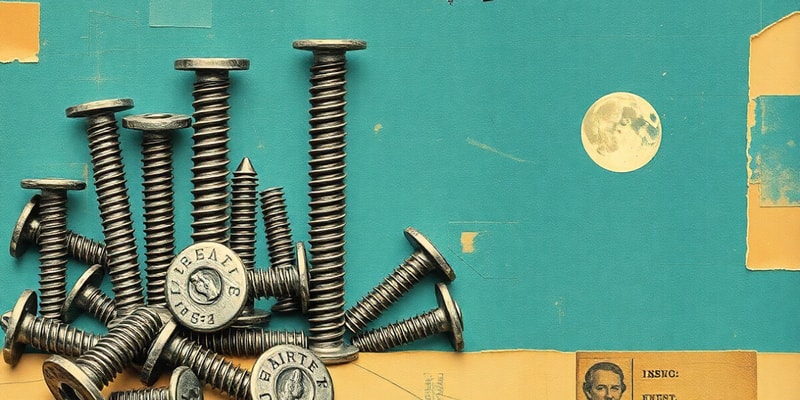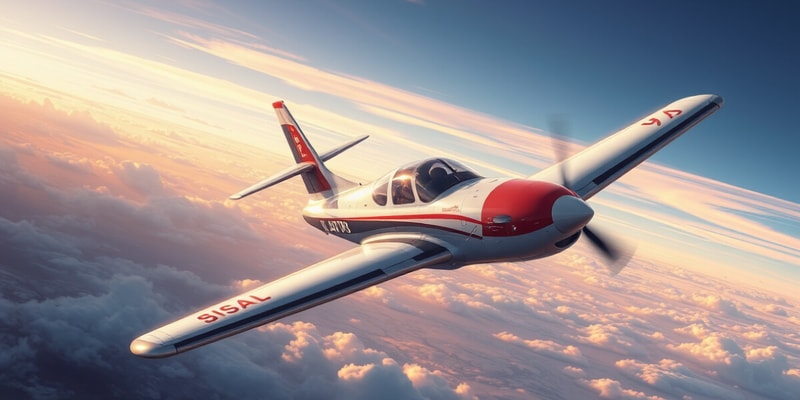Podcast Beta
Questions and Answers
What is the primary difference between machine screws and bolts in aircraft applications?
Which type of screw is known for having the same shear strength as a bolt of the same size?
What type of screwdriver should never be used on a Torqe-Set screw?
What is the purpose of self-tapping screws in aircraft construction?
Signup and view all the answers
Which type of screw is made from lower strength materials and typically has loose-fitting threads?
Signup and view all the answers
Identify the characteristic of Type A self-tapping screws.
Signup and view all the answers
What common feature differentiates machine screws from structural screws?
Signup and view all the answers
Which head type is not interchangeable with the others when referring to structural screws?
Signup and view all the answers
What is a key characteristic of structural screws in aircraft construction?
Signup and view all the answers
Which type of screw is specifically designed to join lightweight materials?
Signup and view all the answers
What type of threads do self-tapping screws typically have?
Signup and view all the answers
What is a common application for machine screws in aircraft?
Signup and view all the answers
Which feature distinguishes machine screws from structural screws?
Signup and view all the answers
What type of head does a Type A self-tapping screw have?
Signup and view all the answers
Which statement is true regarding screwdriver compatibility with screws?
Signup and view all the answers
What characteristic of structural screws makes them suitable for critical applications?
Signup and view all the answers
Study Notes
Aircraft Screw Applications
- Screws are the most common threaded fasteners in aircraft, distinguished from bolts by generally being made of lower strength materials.
- Installed with loose-fitting threads; screw head shapes allow engagement with screwdrivers or wrenches.
- Screws can either have a defined grip length or be threaded along their entire length.
- Three main classifications in aircraft construction:
- Machine Screws: Widely used for attaching lightweight structural components.
- Structural Screws: Equivalent strength to bolts, made from alloy steel, heat treated.
- Self-Tapping Screws: Used primarily for joining thin materials like metal and plastic.
Machine Screws
- Extensively used for fairings, inspection plates, and clamps.
- Machine screws have threads running the full length of the shank, unlike bolts which have unthreaded grip lengths.
- Commonly available in National Coarse and National Fine threads with Class 2, or free, fit.
- Typical head types include fillister head, flat head, round head, and truss head.
Structural Screws
- Made from alloy steel and heat-treated, offering equal shear strength to a corresponding bolt size.
- Shank tolerances similar to AN hex-head bolts, with National Fine threads.
- Available head types include fillister, flat, and washer heads; these are not interchangeable.
- Proper screwdriver type is crucial to prevent damage; avoid mismatching screwdrivers with screw types (e.g., using a Philips on a Torqe-Set screw).
Self-Tapping Screws
- Characterized by coarse threads; ideal for thin sheets of materials.
- Type A features a sharp gimlet point; Type B has a blunt point with finer threads.
- Available head types:
- Round head
- Truss head
- Countersunk head (flat on top)
- Countersunk oval head.
- Truss head is thinner than the round head.
Dowels
- Dowels are solid cylindrical rods utilized for precision alignment between mating surfaces.
- Types of dowels used in aircraft construction include:
- Smooth Solid Dowels: High-quality steel pins ensuring excellent surface finish.
- Hollow Dowels
- Threaded Dowels
- Split Hollow Dowels
- Split hollow dowels can also function as bushings for rotating parts.
- Smooth-sided dowels are typically press-fit installed for stability.
Aircraft Screw Applications
- Screws are the most common threaded fasteners in aircraft, distinguished from bolts by generally being made of lower strength materials.
- Installed with loose-fitting threads; screw head shapes allow engagement with screwdrivers or wrenches.
- Screws can either have a defined grip length or be threaded along their entire length.
- Three main classifications in aircraft construction:
- Machine Screws: Widely used for attaching lightweight structural components.
- Structural Screws: Equivalent strength to bolts, made from alloy steel, heat treated.
- Self-Tapping Screws: Used primarily for joining thin materials like metal and plastic.
Machine Screws
- Extensively used for fairings, inspection plates, and clamps.
- Machine screws have threads running the full length of the shank, unlike bolts which have unthreaded grip lengths.
- Commonly available in National Coarse and National Fine threads with Class 2, or free, fit.
- Typical head types include fillister head, flat head, round head, and truss head.
Structural Screws
- Made from alloy steel and heat-treated, offering equal shear strength to a corresponding bolt size.
- Shank tolerances similar to AN hex-head bolts, with National Fine threads.
- Available head types include fillister, flat, and washer heads; these are not interchangeable.
- Proper screwdriver type is crucial to prevent damage; avoid mismatching screwdrivers with screw types (e.g., using a Philips on a Torqe-Set screw).
Self-Tapping Screws
- Characterized by coarse threads; ideal for thin sheets of materials.
- Type A features a sharp gimlet point; Type B has a blunt point with finer threads.
- Available head types:
- Round head
- Truss head
- Countersunk head (flat on top)
- Countersunk oval head.
- Truss head is thinner than the round head.
Dowels
- Dowels are solid cylindrical rods utilized for precision alignment between mating surfaces.
- Types of dowels used in aircraft construction include:
- Smooth Solid Dowels: High-quality steel pins ensuring excellent surface finish.
- Hollow Dowels
- Threaded Dowels
- Split Hollow Dowels
- Split hollow dowels can also function as bushings for rotating parts.
- Smooth-sided dowels are typically press-fit installed for stability.
Studying That Suits You
Use AI to generate personalized quizzes and flashcards to suit your learning preferences.
Description
Test your knowledge on the various applications and classifications of screws used in aircraft construction. This quiz covers machine screws, structural screws, and self-tapping screws, detailing their specific uses and characteristics. Ensure you're familiar with these essential fasteners in aviation.




